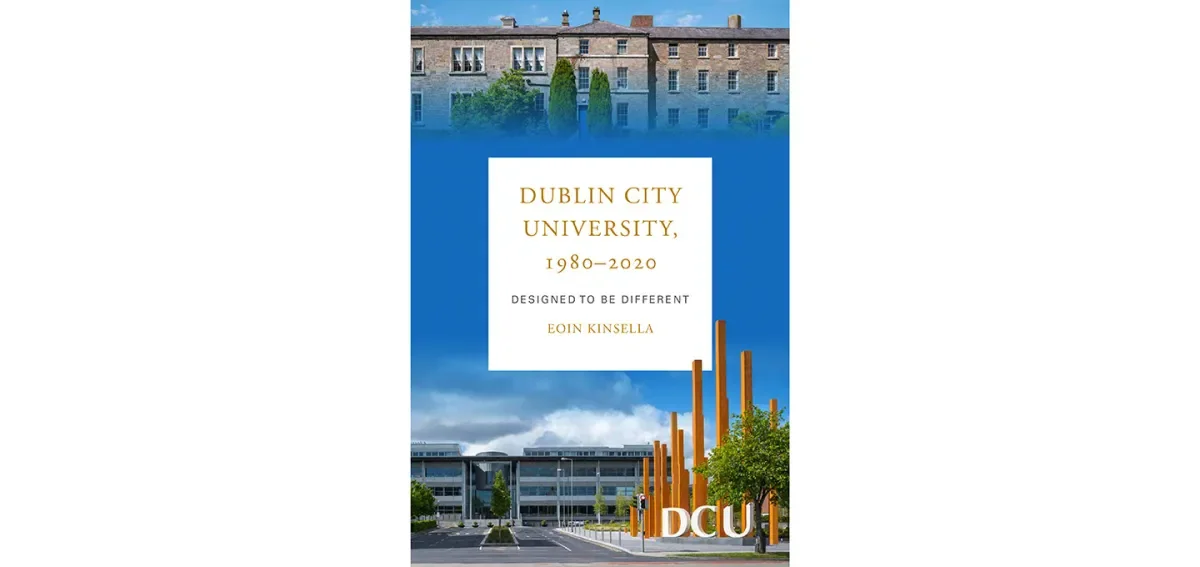

New book chronicles the 40 year history of Dublin City University
A new book, Dublin City University, 1980 - 2020: Designed To Be Different, by Dr. Eoin Kinsella and published by Four Courts Press, chronicles the history of DCU over the past 40 years.
The book details the landmark achievements and many challenges faced by the university over four decades, placing them within the wider context of Irish higher education. The development of DCU’s pioneering curriculum is examined, alongside key milestones such as the introduction of socially innovative education strategies for widening access to higher education. It also looks at the transformative support received from Chuck Feeney and Atlantic Philanthropies. Dr. Kinsella is among the first authors to gain access to Atlantic Philanthropies’ extensive archives, held at Cornell University in New York. The book tracks the evolution of the university’s infrastructure on the old Albert Agricultural College campus in Glasnevin and the incorporation of St. Patrick’s College, the Mater Dei Institute of Education and Church of Ireland College of Education in 2016.
The university has grown rapidly from its origins as the National Institute for Higher Education (NIHE) Dublin, which opened its doors in November 1980 to 191 students. Established to address a major deficit in the technological skills of Irish graduates, NIHE Dublin emerged from a wide-ranging review of the third-level sector during the 1960s and 1970s.
Since it was granted university status in 1989, DCU has evolved into one of the most successful young universities in the world, widely recognised for its educational innovation, its translational research strengths, and its deep engagement with local, national and international communities and networks. Today the university has more than 18,000 students across three academic campuses. After forty years of development and growth, DCU is not only a well-established and highly regarded institution in the higher education landscape in Ireland, but the university has also developed a significant international reputation based on key aspects of its mission and profile.
As explored in the book, university status was also the catalyst for sustained engagement with local communities and concerted efforts to widen access to education, forming the base of a more recent focus on socially innovative education strategies led by staff and students, such as DCU’s Access programme for disadvantaged students, the Age Friendly University and the Autism Friendly University.
Speaking ahead of the virtual launch of the book today, Prof. Brian MacCraith, President of DCU said
“The publication of DCU’s first authoritative and rigorous history represents an important milestone in the university’s 40th anniversary year. The motivation for commissioning the book was not only to mark these significant milestones but also to ensure that the historical record of such a rapidly changing and impactful institution could be captured as accurately as possible, when many of those directly involved in its development could contribute their personal recollections.”
Prof. Daire Keogh, President-designate of DCU said
“Eoin Kinsella has delivered a comprehensive and dynamic history, which traces the development of the culture of excellence, innovation, and engagement that makes DCU distinctive. He pinpoints not merely the University’s unique place within the landscape of Irish Higher Education, but the extent to which DCU has shaped the tertiary system itself."
Dr. Eoin Kinsella said
“The history of DCU is not just a fascinating one in its own right, but also sheds light on the history of higher education in Ireland. The key question I sought to answer while writing this book was, how do you create a modern university out of nothing? Answering that question led me to explore not just DCU’s growth as an institution of teaching and research, but also the architectural history of its historic campus and its pioneering engagement in socially innovative education.
The result is a history that combines educational, political and social history to reveal the past of a unique institution.”
About the author
Dr. Eoin Kinsella is assistant editor with the Royal Irish Academy’s Documents on Irish Foreign Policy project. He is a graduate of University College Dublin and the author of Leopardstown Park Hospital, 1917–2017: a home for wounded soldiers (2017) and Catholic survival in Protestant Ireland, 1660–1711 (2018).
Dublin City University, 1980 - 2020: Designed To Be Different is available from Four Courts Press
Watch the virtual book launch here: https://www.dcu.ie/dcu40/historybooklaunch
